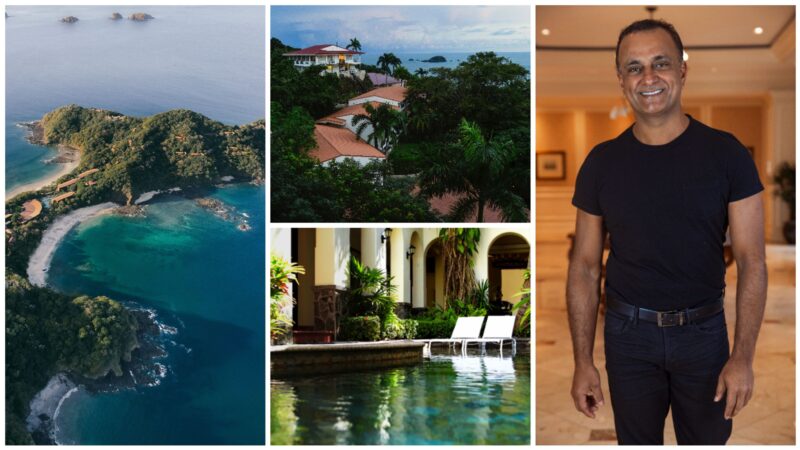Karim Alibhai, the founder of the Miami-based development company Gencom, talks about trends in luxury development in Costa Rica, the Bahamas and beyond
BY SHIVANI VORA
ORIGINALLY PUBLISHED ON DECEMBER 12, 2022
Karim Alibhai, the founder and principal of the Miami-based development company Gencom, may have more than 20 significant residential projects to his name, but he has managed to be among the more under-the-radar developers in the industry.
His ventures focus on resort settings globally and comprise primarily luxury branded residences. Examples include Ritz-Carlton residences in Philadelphia; Key Biscayne, Florida; and Bachelor Gulch, Colorado; as well as Rosewood Tucker’s Point and Fairmont Southampton in Bermuda.
Mr. Alibhai’s most recent project is Peninsula Papagayo, a 1,400-acre development in North Pacific Cost Rica that Gencom acquired in 2016 in partnership with the Cyprus-based investor Mohari Hospitality. The more than $1 billion master-planned community includes two hotel brands with residences attached—Four Seasons Hotels and Resorts and Andaz—and is in the middle of a major growth spurt.
Mr. Alibhai, 58, who was born in Kenya, spoke to Mansion Global about the must-have amenities for any luxury development and why buyers from their 30s to 50s are now his company’s biggest customers.
Mansion Global: Peninsula Papagayo is known for its many amenities, and several more are in the works. Can you describe what currently exists and the ones still to debut?
Karim Alibhai: We have two beach clubs, three spas and several fitness centers with the latest equipment—they all also offer exercise classes. The development also has a marina that can accommodate superyachts, an 18-hole golf course designed by Arnold Palmer, more than 15 restaurants, a tennis center, a nature center and an adventure outpost with a zipline, a ropes course and a mountain bike center.
I am especially proud of our Explorer’s Club, which offers customized experiences, both on and off the property. We have guides that can take you trekking in the rainforest, for example, or on a cultural tour, and naturalists who can take you birdwatching or animal trekking, even after dark.
Upcoming, we’re working on a 20-acre sports park with water slides and a standing surf wave, a village around the marina with boutiques and restaurants, two more beach clubs and a wellness-oriented spa.
MG: These days, what are some amenities that every luxury development in a resort destination must have?
KA: Definitely a sizable spa with numerous experiences like saunas, treatments and different wet areas. When people are in a resort destination, they want to escape to a spa. Also, since guests are captive and stay on property, you need a breadth of restaurants and bars. It’s not enough to have one signature restaurant because people get bored.
MG: Who are your customers?
KA: In the beginning, Gencom’s buyers were mostly retirees. In the last few years, the tables have turned, and we see younger buyers in their 30s, 40s and 50s. These age groups have amassed a good deal of wealth from tech companies or other ventures and are seeking a lifestyle where they can enjoy their wealth.
MG: How important are star architects to home buyers today?
KA: Big name architects do resonate with buyers, but they are not a deciding factor. First and foremost, buyers must love the design of the residence, irrespective of who designed it. The flow and layout are also key. In a resort setting like Costa Rica, outdoor space is a big deal. People want large areas outside where they can spend time.
MG: What’s your definition of luxury?
KA: Excellent service. You can have the best home in the most beautiful, highly amenitized development, but it means nothing if there isn’t service to match. That means the staff at the restaurants, beach clubs, spas and gyms. They should know all residents by name and their children as well. They need to be personal and aware of their preferences and aversions.
MG: With respect to your developments, do you decide to invest based on the potential of the destination or of the project itself?
KA: For me, the destination is the primary driver and then the project. Bermuda is an example. I first looked at it in 2015. It was an “it” country in the 1980s, but at the time I came in, it was on a decline in terms of the quality of the real estate and hotels. The affluent crowd had forgotten about Bermuda and were looking at other destinations to buy homes such as Turks and Caicos and Grand Cayman. But I believed that Bermuda had legs. It offers a perfect mix of Caribbean blue waters and Hamptons chic with its manicured lawns.
Gencom decided to invest. We believed that we could add value to the destination by taking over the Rosewood and Fairmont properties and renovating them to a high standard. We have also streamlined their operations. Rosewood has since increased its revenues by more than 10 times and is one of my favorite places to visit with my four kids.
[This interview has been edited for length and clarity]

